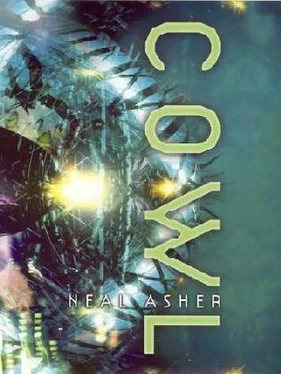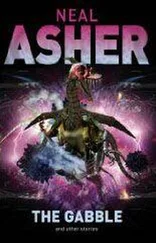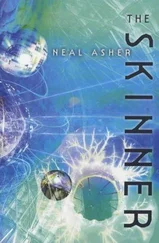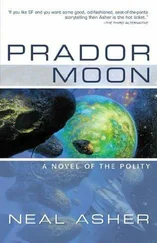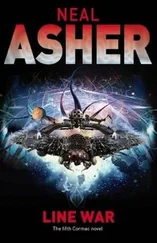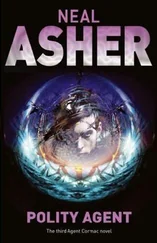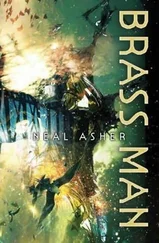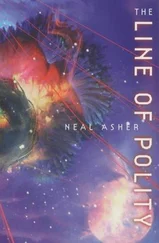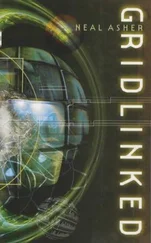Neal Asher - Cowl
Здесь есть возможность читать онлайн «Neal Asher - Cowl» весь текст электронной книги совершенно бесплатно (целиком полную версию без сокращений). В некоторых случаях можно слушать аудио, скачать через торрент в формате fb2 и присутствует краткое содержание. Год выпуска: 2004, Жанр: Фантастика и фэнтези, на английском языке. Описание произведения, (предисловие) а так же отзывы посетителей доступны на портале библиотеки ЛибКат.
- Название:Cowl
- Автор:
- Жанр:
- Год:2004
- ISBN:нет данных
- Рейтинг книги:4 / 5. Голосов: 1
-
Избранное:Добавить в избранное
- Отзывы:
-
Ваша оценка:
- 80
- 1
- 2
- 3
- 4
- 5
Cowl: краткое содержание, описание и аннотация
Предлагаем к чтению аннотацию, описание, краткое содержание или предисловие (зависит от того, что написал сам автор книги «Cowl»). Если вы не нашли необходимую информацию о книге — напишите в комментариях, мы постараемся отыскать её.
In the far future, the Heliothane Dominion is triumphant in the solar system, after a bitter war with their Umbrathane progenitors. But some of the enemy have escaped into the past, intent on wreaking havoc across time. The worst of these is Cowl, an artifically forced advance in human evolution.
Cowl — читать онлайн бесплатно полную книгу (весь текст) целиком
Ниже представлен текст книги, разбитый по страницам. Система сохранения места последней прочитанной страницы, позволяет с удобством читать онлайн бесплатно книгу «Cowl», без необходимости каждый раз заново искать на чём Вы остановились. Поставьте закладку, и сможете в любой момент перейти на страницу, на которой закончили чтение.
Интервал:
Закладка:
Once inside, Tack put Aconite down on her feet and she staggered over to lean against a table.
‘Shut the door,’ she rasped.
Polly did as instructed, stripping her mask off as she returned. Tack and Aconite removed their masks too.
Aconite turned to Nandru-Wasp, who was squatting amid the detritus of her home. ‘Can you find the generator start-up code?’
‘I should think so,’ Nandru replied.
‘Then start the fucking generators!’
After a pause, a low humming vibration permeated the house.
‘Now turn on the vorpal feed.’
The tone of the hum changed, its pitch climbing in degrees until it escalated beyond human hearing. Polly felt again something of what she had experienced when she had shifted—a reminder of the last horrible stages of her journey into this past, a hint of the tor webwork in her flesh and bones and in the very air around her.
‘That’s the best we can do,’ said Aconite, moving to a sofa and slumping down, to rest her head back and close her eyes.
‘What’s your brother doing?’ Tack asked
With eyes still closed, Aconite said, ‘My brother wanted to start again with a clean slate when he tried to avoid the omission paradox. He wiped out all pre-Nodus life on Earth by distributing a network of molecular catalysing engines across the ocean bottom. They do not destroy themselves like the weapons version, so that network still exists.’
‘Why does that affect us? I don’t understand,’ Polly asked, sure she could now see glowing lines showing through the outer walls of the house.
Aconite’s eyes snapped open. ‘Where can my brother go now? Outside the Nodus the Heliothane will hunt him down. They’ll never give up, no matter how inaccurate their vorpal jumping may be—he’s too dangerous. The only place for him is to get beyond reach down the slope. So he has started those engines and the reaction will kill all nascent life existing in every drop of water on Earth—which would have had no temporal effect before this time. It won’t end that nascent life because the dust will blow from land to sea. But enough of it will be wiped out for long enough, to shove him down to the bottom of the probability slope, where it starts here in the Nodus.’
‘But then what, for him… for Saphothere?’ Tack asked.
‘Maybe there his alternate will slide into oblivion, maybe a new and distinct time-line will develop and create its own slopes. The strength of the paradox he is creating would have dragged us down with him, but here, with the vorpal skeleton of this house carrying a huge temporal charge, we may yet hold.’
‘He’s shooting his father,’ observed Tack.
‘Precisely,’ Aconite replied. She waved towards the window, from which Cowl’s citadel was visible. Polly moved over to it and Tack came up behind her. Through waves of falling dust they saw the citadel shimmering, the glow in the sea underneath it blooming and spreading to the horizon, and felt the tension drawing the air taut, as a whole world tried to fold away. The house now began to quake and Tack wrapped an arm around Polly’s waist. Then suddenly light speared down through the citadel and began turning it into ineffable interspace. The house lurched in response to the turning, then juddered as if hit with a missile; fragments of wall material clattering down. Another violent wrench threw Polly and Tack to the floor, and sent things crashing down throughout the interior of the house.
Then stillness.
Tack helped Polly stand and they moved to the window. Cowl’s citadel was gone, the glowing in the sea was gone. The dust storm was now settling.
A billion years in the future, in one possible future, a tachyon signal instantly caused thousands of displacement generators to switch on, where they had been placed on the ceramic shielding of thousands of giant antigravity motors. A second was all that was required, as in that second everything moved: sun, solar system, galaxy… Displaced spheres of tightly packed ceramo-composite components, sheered-off pure metal coils and optics, and silicon-controlling matrices appeared outside the motors, where their temperature rose some thousands of degrees. Metals burnt in bright primary colours, silicon melted, components shattered and the spheres flew apart. Down ducts wide enough to swallow Earth’s moon, walls of fire travelled from these gaseous explosions. From outside, the sun tap blinked with a million stars as flame vented into the chromosphere and joined that fire.
With its antigravity motors no longer focusing and transmitting the candent energies below, the vast device now suffered the true brunt of its proximity to this fusion inferno. The ceramic materials of its construction were created to take huge temperatures, but not this. The underneath of the tap began to melt and ablate. For long minutes, like a drop of water dripped onto a hot plate, it skated on the vapour of its own destruction. It now glowed with an intensity as impossible for a human eye to view directly as were its surroundings. Then it distorted, structural plates the size of continents buckling and springing free. Now firestorms raged out through the gaps as further unprotected components, planetary in scale, felt the savage bite of the solar furnace. Then, as if the fiery elementals had tired of toying with this example of human hubris, gravity closed its fist and dragged the sun tap down into harsher flame. The only sign it left was a smear of cooler red on the sun’s surface, and that lasted minutes only. And by then the back end of the microwave beam the sun tap had been transmitting reached New London and that vast source of power was cut off.
In the Abutment Chamber of New London, Heliothane soldiers watched in horror from behind the heat shields of their attack rafts as the fore of the torbeast fountained from the interface and treed out over them and came down: thousands of open mouths eager to rend and feed. Then light died as the power that kept apart the mono-singularities in the abutments shut down. It took less than a second for the three huge devices to slam together at a central point, severing this fraction of the monster that had shown itself, and incinerating much of it in the subsequent heat flash. The tree fell, writhing and burning, yet containing life still, and the Heliothane rafts attacked, cutting apart necks and smashing mouths, killing any of it that still moved.
The last shield generator burnt out, so nothing remained between Saphothere and Cowl. The Heliothane killer casually pointed his weapon at Cowl’s torso and half expected to feel a lack of satisfaction in this moment, but he could not feel better about what he was going to do.
‘You saw and felt the shift,’ Cowl told him. ‘We are now so far down the probability slope you will never again travel in time unless I can do something.’
Saphothere shrugged. He had seen interspace through the gaps in this control sphere and of course he had felt the shift. He was not sure what Cowl had done, but it seemed unlikely he was lying or that it could be undone. Saphothere was fatalistic about such things and, in his heart, had never expected to return from this last mission. He glanced across at the corpse of Meelan and then to the shattered remains of Coptic.
‘And how should I respond to that?’ he asked.
‘You can survive here. There will be Umbrathane still alive in this citadel. We can build something.’
Yeah, thought Saphothere—now he knew Cowl was lying.
‘Thing is,’ he said, ‘I was always better at destroying things.’
With improbable speed for one so injured, Cowl leapt towards him. Saphothere triggered his carbine, hitting the black shape in mid air and stepping aside as it flailed past him, smoking and with pieces of its carapace splintering away. Cowl hit the ground then writhed round, coming up into a crouch. Hissing, he opened his face. Saphothere concentrated his next shots into that and killed him there.
Читать дальшеИнтервал:
Закладка:
Похожие книги на «Cowl»
Представляем Вашему вниманию похожие книги на «Cowl» списком для выбора. Мы отобрали схожую по названию и смыслу литературу в надежде предоставить читателям больше вариантов отыскать новые, интересные, ещё непрочитанные произведения.
Обсуждение, отзывы о книге «Cowl» и просто собственные мнения читателей. Оставьте ваши комментарии, напишите, что Вы думаете о произведении, его смысле или главных героях. Укажите что конкретно понравилось, а что нет, и почему Вы так считаете.
